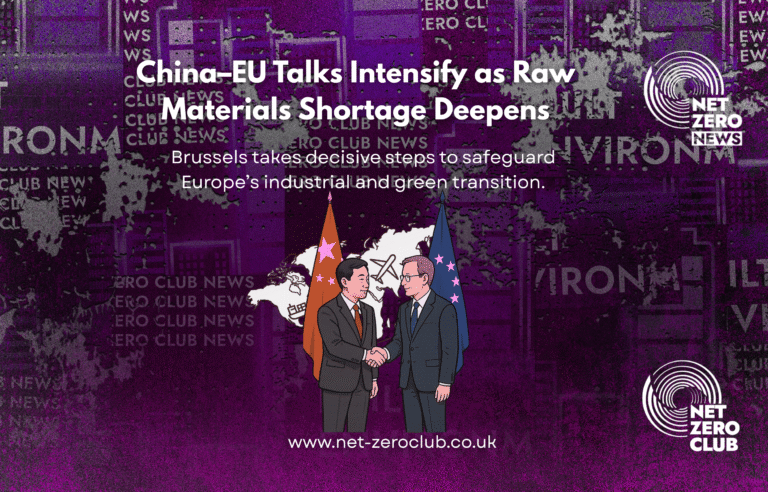EU Delays Anti-Deforestation Rules Again: What You Need to Know

Welcome, Net Zero News readers,
In a significant twist of events, the European Commission has once again proposed delaying the implementation of the EU’s flagship anti-deforestation law, marking the second consecutive year such a delay has been considered. This decision comes amid ongoing efforts to reduce regulatory burdens on businesses, a move that has sparked widespread debate within environmental circles.
At the heart of the proposed regulation is a commitment to combat deforestation. The law seeks to prevent the use of commodities produced on deforested land, aiming to safeguard critical ecosystems and promote sustainable practices. However, the initiative has faced resistance from various sectors of the economy, particularly those that argue the requirements may impose complex and burdensome regulations.
Jessika Roswall, the EU’s environment commissioner, explained the rationale behind the delay during a recent press conference. She stated, “We still cannot believe that we can really get this without disruption for our businesses. We need the time to combat the risk with the load of information in the IT system.” This acknowledgment of the challenges faced by businesses highlights the difficulty of balancing environmental objectives with economic realities.
The regulation was initially set to take effect on December 30, 2024. However, it was previously postponed to the end of this year, providing companies and trading partners an additional year to prepare for compliance with the stringent tracing and due diligence requirements. Now, it seems that even more time is needed, prompting the Commission to send letters to both the Council of the EU and the European Parliament proposing yet another extension.
This recent development is part of a broader trend within the Commission, which has been perceived as increasingly prioritising industrial competitiveness over environmental concerns. Since late last year, the Commission has taken several actions that weaken or delay green regulations, reflecting a grand strategy to eliminate bureaucratic hurdles and enhance the global competitiveness of European industry.
The anti-deforestation rules specifically target commodities such as coffee, beef, soy, and palm oil. These commodities can have devastating effects on forests and biodiversity when produced on deforested land. The regulation mandates that companies delve deep into their supply chains to ensure that these products have not contributed to deforestation or related human rights abuses. Many businesses have expressed concerns that the necessary information for compliance is often challenging to obtain.
Despite these challenges, Commissioner Roswall has firmly stated that the Commission’s decision to delay the regulation is not a result of external pressure from trade partners, including the United States, Japan, or Malaysia. She also dismissed suggestions that the delay is connected to the conclusion of complex trade negotiations with Indonesia, the world’s largest exporter of palm oil.
Furthermore, Roswall has indicated that the Commission is open to revising the substance of the deforestation rules. “The other thing that we also have been working [on] for a long time is the simplification of different angles,” she mentioned, emphasising the Commission’s commitment to ongoing discussions with EU ministers on this matter.
A majority of EU member states expressed their support for delaying the application of the deforestation rules earlier this year, seeking cuts to specific measures before the law is fully implemented. This sentiment reflects a growing concern among member states regarding the potential economic impact of the regulation on various industries.
An EPP Win
The centre-right European People’s Party (EPP), which holds a significant position in the European Parliament, has been a vocal advocate for weakening and delaying the anti-deforestation rules. Peter Liese, the EPP’s environment spokesman, celebrated the Commission’s decision, stating, “Our efforts have finally been successful. If the deforestation regulation had entered into force unchanged on 1 January, it would have caused unsolvable problems for many small foresters, farmers, and small and medium-sized enterprises, such as medium-sized coffee roasters.”
However, the reaction from environmental groups has been overwhelmingly critical. Activists have condemned the Commission’s decision, labelling the delay as “unacceptable” and a “massive embarrassment” for President von der Leyen and her administration. Anke Schulmeister-Oldenhove, the forest policy manager at the WWF European Policy Office, stated that if the technical issues cited by the Commission are genuine, they illustrate “not only incompetence but also a clear lack of political will to invest sufficiently in a timely implementation of the EUDR.”
Thomas Waitz, the agriculture coordinator for the Greens, described the delay as a “dark day for global forest protection,” underscoring the broader implications for environmental conservation and biodiversity preservation.
Critics argue that the Commission appears to be capitulating to the desires of the agricultural industry and the sawmill lobby, as well as their allies within the EPP. A recent study revealed that deforestation has resulted in the deaths of over half a million people in tropical regions over the past two decades due to heat-related illnesses. Another study highlighted that approximately 75% of the decline in rainfall in the Amazon rainforest is directly attributable to deforestation.
The debate surrounding the EU’s anti-deforestation regulation encapsulates the ongoing struggle between economic growth and environmental sustainability. As the Commission grapples with the complexities of implementing such vital regulations, it must also navigate the competing interests of various industries and member states.
This latest proposal for delay raises important questions about the EU’s commitment to combating climate change and preserving vital ecosystems. The road ahead for the anti-deforestation regulation remains uncertain, as stakeholders on all sides continue to voice their concerns and advocate for their interests.
As we move forward, it is crucial for the EU to strike a balance between fostering economic growth and protecting the environment. The decisions made in the coming months will undoubtedly have lasting implications for both the EU and the global community in the fight against deforestation and climate change.
In conclusion, the EU’s proposal to delay the anti-deforestation rules has sparked a heated debate, highlighting the complexities involved in balancing economic interests with environmental responsibilities. As advocates for a sustainable future, we must remain vigilant and engaged in these discussions, holding our leaders accountable for the choices they make that will shape the planet’s future.
Thank you for reading, and let’s continue to champion the cause of net zero together!

 Got net-zero news, project updates, or product launches to share?
Got net-zero news, project updates, or product launches to share? 



